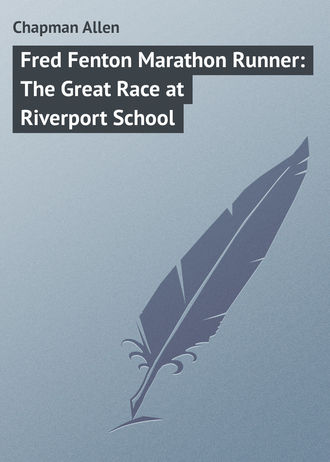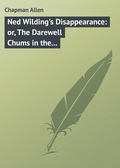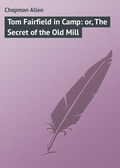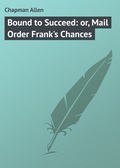
Chapman Allen
Fred Fenton Marathon Runner: The Great Race at Riverport School
CHAPTER XX
WHEN THE CIRCUS CAME TO RIVERPORT
"You'll go home if we can get you there, won't you, Tom?" asked Fred, after a little time had clasped, and the poor fellow on the hay seemed better able to reply, having mastered his emotions.
"I'd be a fool not to say yes!" he exclaimed, eagerly. "'Specially when you tell me my folks they want me home again. I've lived a dog's life ever since I run away. Hain't never dared to ask about news from Riverport, 'case I reckoned Chief Sutton he must be alookin' everywhere for me. I'll go home, and thank you, fellers; you jest better b'lieve I will!"
That settled one thing; Fred knew he could not expect to finish that run. Indeed, the roads were not in the best of condition after the storm for anything like comfort, and perhaps it might be just as well for them all to give up trying to foot it along the rest of the course.
Having hastily considered this matter, he broached the subject to the others.
"Let's look at the thing, boys," he began, as they gathered around him, knowing that a plan of campaign was being considered. "What we wanted most of all was to get familiar with this cut-off up here."
"No trouble about the rest of the route," ventured Colon, "because it's going to be along the open roads, and every fellow can get it down pat from studying the map they've posted. But this cut-off is left blank."
"Meaning that you can go all the way around, making three miles, or else take your chance in cutting across country," Bristles added.
"Well, my plan is something like this," continued Fred. "Let's pick out the first good afternoon next week, get a car from somewhere, if we can borrow one, and run up here. Then we can cross over to the toll-gate, and back again. That ought to fix things so we'll never miss the way when the big date comes along."
"Hear! hear!" cried Bristles.
"We like your plan, Fred," replied Sid, "and for one I'm ready to call this run off. The weather is against us, and we'd have a high old time splattering through the mud for about thirteen miles."
"Besides," added Colon, "we think we ought to be along when you take Tom Flanders home to his folks. I happen to know how bad they've felt about his being gone!"
That seemed to settle the matter in so far as continuing the trial spin went. Fred was not sorry, because he felt that he would enjoy having his cheery chums along with him.
"Then the next question is, how we're going to get home?" and he turned to the injured boy, to say; "You haven't told us just how you came to break your leg, Tom, and why you didn't manage to crawl to the house so as to get help?"
"I knowed the old man an' his wife they was all away to-day, that's why," was the reply Tom made; "an' as for my accident, it happened so quick I couldn't hardly tell about it. Reckon I ketched my foot in some loose board up in that leetle loft, where I was adoin' somethin'. Fust thing I knowed I felt myself flyin' every which way, over the edge, and kim down on the ground, with my leg doubled under me. Then I jest seen things aswimmin' all around me. Guess I fainted, for next thing was when I kim to, an' found myself groanin' bad. When I moved ever so little it nigh made me jest scream."
"How long do you suppose you've been lying here?" asked Bristles, softly, for he had been much affected by what he saw and heard.
"Mebbe hours, for all I know, Bristles. They went off jest after daylight, meanin' to take the load to Peyton, where they deals in the grocery line. Wouldn't let me do it, 'case they meant to buy the old woman a 'frock, you see. Is it near night time, now, Bristles?"
"Oh! no, the morning isn't more than half over, Tom," replied Bristles.
"But how about some sort of rig we could borrow, to give you a lift to
Riverport? Have the old couple taken the only outfit along. Tom?"
"I hear a horse munching hay over there somewhere," announced Colon.
"Yes, there is a critter in here," Tom admitted, with the nearest approach to a smile that had thus far come upon his wan and pain-racked face; "and under the shed stands what you might call a wagon, if you shut your eyes, an' didn't care much what you was asayin'. If old Dominick didn't keel over, and kick the bucket on the way, he might pull us ten miles or so; always providin' you give him some oats before you started him, and then kept temptin' him on the road with more of the same."
Bristles gave a shout.
"Oh! we'll fix old Dominick, never you fear, Tom. I'll look up the oats right away, and let him get busy, while the rest of you pull that wagon out of the shed, and find something in the way of harness. We don't care a red cent for looks, as long as we get there. The end justifies the means. You remember we learned that lots of times at school. Get a move on, boys; everyone to his duty!"
Thus inspired, and spurred on, the others hastened to do their part. Two of them hunted until they found the lean-to, under which a ramshackle wagon stood that excited the laughter of Colon.
"If Bristles thought the vehicle that little girl had along with her in Riverport was a terror, what'll he ever say to this?" he remarked, after he had doubled up several times in explosive merriment. "Now, if the hoss is anything like what Tom says, I c'n see what a sensation we'll kick up when we strike town. Why, they'll ring the fire bells, and get the chemical engine out to parade after us. Guess they'll think the circus has struck Riverport early this year."
Meanwhile Bristles had succeeded in discovering a small amount of oats in a bin, and he emptied a generous lot of these in the trough of the antiquated looking horse. The animal had started whinnying the instant he heard the boy moving over in that corner, where he must have known the grain was kept, though he seldom had more than a handful at a time.
It was a whole hour before they managed to get the rig fixed up. Indeed, only by the united efforts of all the boys was the bony horse dragged away from his feed trough, where he had kept munching the oats delightedly.
Then they hunted up all the old horse blankets, and empty gunny-sacks they could find about the place, and made a soft bed in the wagon. A stretcher was also improvised from some boards, and when four of them took hold they managed to carry poor Tom to the nearby vehicle, and deposit him on the sacks.
Being guided by directions which Tom gave them, they found how a road wound through the woods to the road, striking the main thoroughfare just above where they had come out on their previous trip, and with the toll-gate in sight.
"Here's where we gain something, boys," Fred told them, "and this Good
Samaritan job may count in our favor next week when we make that run."
Fred had been thoughtful enough to write a little note, addressed to the owner of the wretched outfit, whose name it seemed was Ezekial Parsons. In it he explained just how they happened to find poor Tom, and that they had borrowed the rig to get him to his home, where he could have proper care.
He had also promised that the horse and wagon should be returned in due time, and hinted that his father and mother might be expected to run up and make the acquaintance of the old couple who had been so kind to Tom, although not really able to keep a hand about the place.
The man at the toll-gate stared, as well he might, when that antiquated rig came in sight, with the four boys partly bundled in faded horse blankets and gunny-sacks. The weather had not yet cleared, and the air was chilly for fellows as devoid of clothing as runners always are.
When he heard about the accident that had happened to Tom, he was loud in his praise of the action of the boys in giving up their trial spin just to get the injured boy home.
"If I had a hoss myself, I'd gladly loan him to you, boys," he told them.
"Oh! never fear but we'll be able to get there before sun-down," laughingly declared Fred, while Bristles ran around in front, and held the measure of oats close to the nose of the horse, starting him to snorting wildly, and taking a step forward in the effort to obtain the feed, kept so tantalizingly just beyond his reach.
Bristles continued backing away, and always keeping just so far in front, so that the horse was impelled to move along quite briskly. If he lagged at any time the measure was moved closer, and once Bristles even let him thrust his nose into it.
On the wagon the boys had a very merry time of it, singing, and laughing at the actions of the poor old horse.
"Please don't excite him too much, Bristles," begged Sid, "for he's likely to strain so he'll smash this beautiful harness all to flinders."
So they kept up the work, Bristles and Colon between them dancing on ahead, and tempting the animal between the shafts to renewed exertions. With that measure of oats held within smelling distance of his nose he kept plodding steadily along, and mile after mile was placed in their rear.
Once they halted, and watered old Dominick at a wayside spring, besides letting him have a delightful five-minute communion with the oat crop. Then the forward movement was begun, again, and the boy who held the measure of oats continued to dance just ahead of the deluded Dominick.
It was about two o'clock on that Saturday afternoon when a great commotion broke out in the outskirts of Riverport. Boys and girls flocked to the spot, and loud cheers rent the air. Indeed, plenty of people actually made sure that the circus must have arrived ahead of time, and as this was an event in which every citizen was supposed to be interested, since he would be compelled to take his youngsters to the show, plenty of men were in the throng that gathered.
Dogs barked, chickens set up a cackling and crowing, and there was a perfect Bedlam of sounds along the main street. Down this came that wonderful vehicle with sundry creaks and dismal groanings, as though threatening to break down at any minute. Ahead strode a boy in running costume, tempting the tired old horse to walk along by holding a peck measure under his nose, and occasionally just letting him snap up a few of the oats.
Three other fellows sat in the wagon some of them trying to keep warm by covering themselves with gunny-sacks, and all laughing, and joining in the cheers of the crowd.
Of course everybody thought it was only a boyish prank, but when they saw the old wagon draw up in front of the Flanders home, and then those four boys start to gently lift a figure out from the bed of the vehicle, the noise ceased as if by magic.
"Why, it's sure enough Tom Flanders come back home, after his folks had given him up for lost!" one good woman told a new arrival. "They do say Fred and the running boys found him up-country, where he'd broke his leg. Poor fellow, he looks that peaked and pale I reckon he's had a terrible time. And see how his maw hangs over him, like she was the happiest woman in all Riverport this day. And we all hope that Tom'll turn over a new leaf after this, and make his folks proud of him. But wasn't it fine of Fred and his friends to bring him home that way?"
And certainly, when those four lads witnessed the wild delight of that mother and father at having their only son restored to them again, as well as noted how the erring boy cried when he allowed himself to be carried into the house, none of them had the slightest reason to regret that circumstances had caused them to take refuge from the storm in that old barn standing near the trail through the woods.
CHAPTER XXI
THE GREATEST OF DAYS
When the day set for the great Marathon race came around, everybody in Riverport agreed that the weather clerk had certainly outdone himself in order to give the runners an ideal occasion. There was not a cloud in the sky. Then, while the air was sparkling and inclined to be cool, the breeze was not so strong that it would make running difficult.
Early in the day crowds began to arrive from the two neighboring towns. They came in all manner of conveyances, from farm wagons to the finest of automobiles. Music could be heard in the air, for the Riverport Brass Band had decided to honor the great occasion by playing at intervals all day long.
Ample preparations had been made for seeing the grand finish, which, as with the start, was to take place on the great level commons bordering the town, and alongside of which the main road ran.
Here a grand stand had been erected for the use of the honored guests from Mechanicsburg and Paulding, as well as several other smaller places, each of which was also sending its quota of eager eyed strong-lunged boys to root for their favorite team.
The race was scheduled to start at exactly one o'clock. This had been settled on as the best hour, since it would allow everybody who expected to be present to reach town, and also give the runners plenty of time to cover the course.
No doubt that morning dragged along worse than any boy in Riverport had ever known time to drag before. They wandered back and forth in droves, all excited, and anxious to hear the latest reports concerning the condition of those who were expected to compete.
Several startling rumors were circulated. One was to the effect that Colon had been taken with cholera morbus in the night, and was a complete wreck that morning, which would eliminate him from the race. Another went on to tell how Fred Fenton had cut his foot, when chopping wood just to keep himself in condition, and it would be utterly out of the question for him to enter the competition.
These things gave the loyal rooters for Riverport a terrible shock, and messengers were instantly dispatched to the homes of the two heroes to ascertain whether there could be any truth in the wild rumors. When they came back and reported that both Fred and Colon were in the pink of condition, and simply taking things easy so as not to tire themselves out before the time, the shouts that arose caused people to rush to their doors and windows, wondering if the race had been prematurely started.
Still the crowds kept pouring into Riverport, until the streets became fairly congested with the throngs. Business, except for feeding this vast multitude, and selling them little flags and buttons, seemed to be absolutely suspended, so that many stores were shut up at noon, not to be opened again until the question of supremacy had been fully settled.
Fred had not forgotten to get that forlorn rig back to the owners, and in so doing he had had occasion to make the acquaintance of the old couple. His father and mother drove up that very Sunday afternoon, and from what Fred heard them say after returning, he felt sure that things were going to improve very much with the Parsons. Mrs. Fenton expected to get a number of her friends interested in some fancy work she had examined, and there were numerous other ways by means of which the couple could be assisted without allowing them to feel that they were objects of charity to the community.
Of course the four boys had managed to secure a car, by means of which they ran up on Wednesday afternoon after school hours. There was time enough before the shadows began to gather for them to go over the cut-off several times. They examined every foot of the way, and just as Fred had said, it was found that by following the obscure road that led from the Parsons farm to the main highway above the toll-gate, they could save at least seven precious minutes.
This was bound to be of considerable importance to them, provided none of their rivals from the other towns discovered the same thing, for of course it was expected that nearly every contestant would take advantage of the cut-off. Indeed, very likely all of them had been prowling around before now, the idea being to become familiar with the ground.
Fred had called the others up over the wire about the middle of the morning, and what Colon called a "grand powwow" was held at his house. Sid, Bristles and Colon gathered there to talk matters over with Fred, and learn if any new development had taken place which might prove important in the result.
Of course, after the start it was supposed that every contestant would run his own course, and hence Fred believed it to be good policy that the Riverport contestants should be in full sympathy with the plan of campaign.
Some of the other high school boys, particularly chums like Brad Morton, who had expected to be in the race until he sprained his ankle and had to give up all hope of competing, Dave Hanshaw, Semi-Colon, Corney Shays, and Dick Hendricks, hung around the Fenton house, hoping to get an occasional glimpse of their representatives, who, they knew, were in consultation.
At half-past eleven Fred gave his three friends a little lunch, but he had exercised great care with regard to the character of the food, which his mother prepared with her own hands. It was calculated to give them endurance without any bad after effect.
"We're all invited over to Sid's house for dinner to-night, remember," Fred told them, as they sat around the table, with the rest of the family waiting on them just as though they might already be looked upon in the light of heroes, "and let's hope we'll have a jollification there, with the prize for winning the Marathon in the safe keeping of good old Riverport High for this year."
"So long as we win, and fairly at that," said Sid, "none of us cares very much who crosses the line first, though of course everyone hopes to have that great honor. But from what I know of this bunch, there isn't a single fellow present who would hesitate to eliminate himself, if by doing so he could advance the interests of the school!"
"Hear! hear!" cried Colon, "that's our sentiment, every time, Sid. Riverport High first, and self next in this sort of rivalry. And believe me, we're going to keep that Marathon prize right here in town this year."
CHAPTER XXII
"THEY'RE OFF!"
"Somebody please give me the official list of entries; I'm not sure I have it right," and as Cissie Anderson said this she looked around her at the clump of enthusiastic school friends, both boys and girls, surrounding her seat in the grandstand.
There were Flo Temple, Mame Wells, and several other girls, as well as Semi-Colon, Cornelius Shays and a few other fellows who believed in being comfortable during the long wait, while the contestants were absent.
"That's me, Cissie," Semi-Colon spoke up, flourishing a paper proudly. "I've just come from the blackboard where they've posted the names of the entries. You know each school was to be limited to four contestants?"
"Yes, but please give me the list," said Cissie, impatiently. "They're beginning to gather around the starting line, and I want to be sure I've got everything correct. Just think how small I'd feel if I cheered the wrong one."
"You can cheer everybody," Flo told her, "until the time comes to welcome the first runner, and then Riverport hopes to do herself proud."
"Mechanicsburg has four entries," Semi-Colon announced, purposely raising his rather puny voice so that every one within a radius of twenty feet might profit by his knowledge, "and they are Dolan, Wagner, Waterman, and Ackers. The last named is called the Mechanicsburg Wonder, and they all say he's going to win this Marathon in a walk."
At that there were scornful exclamations from the faithful Riverport rooters.
"We've seen Ackers run plenty and good, when he played left tackle on their football eleven!" announced one boy, jeeringly.
"And if I remember rightly he didn't run fast enough to make many touchdowns, eh, fellows?" exclaimed another Riverport student.
"You wait and see, that's all!" they were told by an indignant girl nearby, who undoubtedly had her home in the up-river town.
"Yeth," added her companion, a boy who lisped terribly, but was not prevented by this affliction from speaking his mind in behalf of his native town, "they thay thosth that laugh lasth laugh loudetht. Justh wait, and thee which thide of your mouth you laugh from, fellowth."
"Well, I've got Mechanicsburg down all pat, Semi-Colon," observed Cissie, who had smiled sweetly while this side talk was going on, "and now how about Paulding?"
"Only three entries there," the answer came, "because Ogden was hurt on a practice run yesterday afternoon, and it was too late to grind a substitute into decent condition."
"Then they are Collins, Everett and Badger; is that right?" asked Cissie, as she poised her lead pencil over her little pad.
"Correct," Semi-Colon announced. "You all know who Riverport's boys are going to be, but all the same I'll just mention them. Their names seem to roll off my tongue as easy as anything – Sid Wells, Colon, Bristles Carpenter, and last hut far from least, our splendid all-around athlete, Fred Fenton."
There was a generous clapping of hands around that section of the grandstand; although the pair from Mechanicsburg looked scornful, and shrugged their shoulders in truly loyal style, for they were faithful rooters for their home town.
"There is no such thing as a handicap in this race, I understand?" remarked a gentleman who apparently was a stranger in the vicinity, for no one seemed to know him.
"Oh, no sir, such a thing isn't ever considered in a Marathon race," Semi-Colon immediately told him. "Every tub has to rest on its own bottom, and the fellow who can stand the gruelling run best is going to come in ahead of the string."
"There are eleven entries, I believe you said?" continued the gentleman, who was evidently looking for general information, not being much of a sporting patron, "and if they all start out in a bunch, I should think there might be some little confusion."
"Not at all, sir," the boy assured him. "Each runner has a big number fastened to his breast and back, so that he can be known at a distance. In that way the judges can see any trickery that may be attempted. And besides, although they may start off in a clump, before three miles have been run the chances are they'll be strung all along the road, and with numerous little hot sprints to get the lead."
"And while waiting for them to come in sight, what is going to happen here?" continued the gentleman, waving his hand toward the open space before the grandstand where preparations had evidently been made for other entertainments.
"Oh! amuse the crowd, and keep them from getting too anxious," Semi-Colon told him, readily enough, for his greatest delight was to spread information. "The committee on sports has arranged several comical entertainments. There's going to be several sack races to begin with; climbing the greased pole for another thing; catching a greased pig for another; and a three-foot race to wind up with."
"A three-foot race!" repeated the gentleman: "I don't know that I've ever heard of that; would you mind explaining a little further, my lad?"
"Oh! the contestants are entered in pairs, you see," Semi-Colon told him. "They are bound together that way, one fellow having his left leg fastened to his partner's right. It's a great sight to see how they blunder along, and fall all over themselves. I know some fellows who have been practicing the stunt; but even then, in the excitement they're apt to get into a terrible muss."
"Well, all that ought to keep the people in good humor while the time is passing, I should think," the stranger remarked, laughingly. "And now, would you mind telling me a little about the rules of the great race? I understand that the course covers twenty-five miles in all?"
"Yes, sir, if any contestant chooses to go over the entire distance," he was informed by the willing Semi-Colon, who kept one anxious eye on the spot where the various runners were now gathering, as though the time for starting might be drawing very close now.
"What do you mean by saying that, please? Is there any way by which they may shorten the distance?" continued the gentleman.
"That's just it, sir; at the upper end they can cut off three miles by taking a short-cut through the woods and along the border of a marsh, coming out on the other road at the toll-gate, and then turning toward home."
"I understand what you mean, and I suppose that every one will undertake that shortening of the journey?"
"Well, I hear there's some talk of a Mechanicsburg fellow who means to run it out on the road all the way," Semi-Colon told his persistent questioner.
"What reason would he have for doing so, son?"
"The old one of the hare and the tortoise, sir," the Riverport student remarked, with a shrewd look. "You see, there's always some chance that the fellows who try to make that cut-off may get confused, and lose their way. If they strike the other road below the toll-gate, why they're compelled to go all the way back so as to register."
"Register!" exclaimed the other, in a puzzled tone.
"Why, it's this way," he was informed by the willing and talkative Semi-Colon, "the committee has laid out registering stations at certain places along the course, where every runner has to sign his name in his own fist, also the exact time of his arrival; then he is at liberty to shoot off again as he pleases. One of these is just below where the cutoff begins, and another at the toll-gate on the home road."
"Oh! I begin to grasp what you mean now," the stranger in Riverport remarked, as he nodded his head. "All this is done so that there shall not be the slightest taint of unfairness or cheating about the race?"
"You better believe there won't be, sir!" declared Cornelius Shays. "Nobody will ever be able to say Riverport won on a foul, or by taking any unfair advantage of her rivals. It's going to be a clean game and a great victory!"
"When they line up, please tell me the numbers of your friends, and also those from the other schools. I happen to have a pair of field-glasses with me, and when the first runner comes in sight away up the road yonder, I may be able to return your kindness by telling you positively what his number is before you could distinguish it with the naked eye."
"There they are lining up now, Semi!" exclaimed Cissie, eagerly, and as Sid Wells was a very particular friend of hers, it can be set down as certain that her eyes picked him out of the eleven just as quickly as his sister Mame could have done.
Accordingly, as the line swayed there, with the contestants listening to the last plain instructions from the master of ceremonies, warning them of what penalties would be sure to follow any fouling in the race, Semi-Colon told the stranger in Riverport just which number represented each entry.
"The first four numbers belong to Mechanicsburg, you see, Ackers leading as One, Dolan Two, Waterman Three, and Wagner Four. Then come our fellows, with Sid Wells Five, Fred Fenton Six, Colon Seven, and Bristles Carpenter Eight. Number Nine is Collins of Paulding, with Everett Ten, and Badger Eleven. There is no Twelve, you see, sir, because Ogden is knocked out."
"Hold up now, Semi-Colon, they're going to make the start, and we don't want to keep hearing you talking forever," a boy in the second row behind called out; at which the shortened edition of the Colon family cast an aggrieved glance back that way, but nevertheless held his tongue.
"Now, watch, he's going to fire the pistol!" gasped Cissie Anderson, with her eyes fairly glued upon the line of young athletes who expected to compete for the honor of winning the great Marathon.
Then came a spiteful little crack of the pistol the starter had been elevating.
"They're off!" shrieked hundreds of voices, and a tremendous billow of cheers rang out, to send the eleven runners on their way with a firm determination lodged in each and every breast to strain himself to the utmost in order to be the fortunate winner.
Up the road they went at a furious speed, bunched together in the beginning, yet with several already showing signs of breaking away, and taking the lead.







